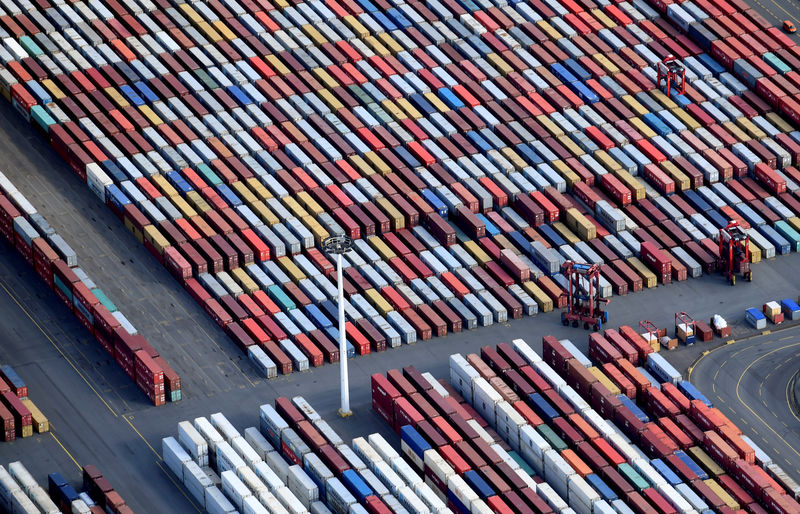By Michelle Martin and Paul Carrel
BERLIN (Reuters) - Germany's leading economic institutes slashed their forecasts for 2019 growth by more than half on Thursday and warned that the economy - Europe's largest - could slow much more if Britain quits the European Union without an agreement.
Industrial orders in Germany fell by the biggest margin in more than two years in February, slumping 4.2 percent, highlighting the extent of the slowdown amid global trade disputes and the risk of a no-deal Brexit, which could happen at the end of next week.
The institutes cut their overall growth forecast for this year to 0.8 percent from a previous 1.9 percent and said risks had increased since the autumn.
They pointed to Britain's expected departure from the EU and trade conflict between the United States and China, triggered by U.S. President Donald Trump's 'America First' stance.
Germany is in its 10th year of economic expansion, but with growth slowing, Oliver Holtemoeller, one of the economists involved in the institutes' report, warned: "The long-term upswing of the German economy has come to an end."
Long the euro zone's economic powerhouse, Germany narrowly skirted a recession at the end of last year and posted its weakest growth in five years in 2018 as its export-orientated economy is slowed by the trade and Brexit headwinds.
Chancellor Angela Merkel has repeatedly said she will "fight until the last minute" for an orderly Brexit. She is using a trip to Ireland on Thursday to consider how to prevent a no-deal "hard Brexit".
TIGHTER FINANCES
Germany's slower-than-previously-expected growth means Finance Minister Olaf Scholz's fiscal room for maneuver is getting tighter as tax revenues are likely to come in lower than expected this year.
Last month, the cabinet passed a draft budget for 2020 that calls for a 1.7 percent spending increase and relies on ministries to cut costs to avoid incurring new debt in light of the slowdown.
The tighter public finances - after years of budget surpluses routinely exceeding expectations - are starting to raise tensions over spending priorities in Merkel's awkward grand coalition, senior party officials say.
Defense Minister Ursula von der Leyen said last month the ministry would have to fight next year to ensure that defense spending continues to expand as a share of the overall economy to move toward the NATO target of 2 percent of economic output.
The institutes' forecasts were completed by March 29, the date Britain was originally due to leave the EU, when the institutes assumed it would not quit without an agreement on the terms. The deadline has since been extended to April 12.
Their estimates feed into the government's own growth projections, which will be updated later this month. In January, the government forecast growth of 1.0 percent for this year.
Economy Minister Peter Altmaier said the slowdown in Germany seen in the second half of 2018 would be overcome during the course of this year and replaced by an economic upswing.
Officials are hopeful that once global trade disputes and Brexit are resolved, growth can pick up next year.
The drop in orders in February was marked by a slump in foreign demand, data from the Economy Ministry showed.

"Awful new-order data suggests that German industry is still suffering from Brexit woes and global uncertainties," said ING economist Carsten Brzeski.